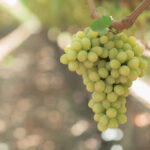U.S. study finds grapes could help prevent age-related blindness
Fordham University researchers have found grape consumption may be able to help slow or prevent age-related macular degeneration, which is a condition that leads to blindness. 
The study, published in journal Free Radical Biology and Medicine, compared the incidence of the condition between mice with grape-enriched diets, additional lutein diets and normal diets.
The result was that grape-eating mice were protected against oxidative damage of the retina, which prevented blindness. Lutein was found to be effective but grapes offered more protection, which was likely due to their antioxidant properties.
"The protective effect of the grapes in this study was remarkable, offering a benefit for vision at old age even if grapes were consumed only at young age," said principal investigator Silvia Finnemann.
"A lifelong diet enriched in natural antioxidants, such as those in grapes, appears to be directly beneficial for retinal health and function."
California Table Grape Commission president Kathleen Nave says the research is a good sign for the grape industry.
"Preserving eye health is a key concern as we age and this study shows that grapes may play a critical role in achieving this," she said.
"This is good news for consumers of all ages who enjoy grapes, and adds to the growing body of evidence that grapes offer an array of health benefits."
Photo: California Table Grape Commission











































